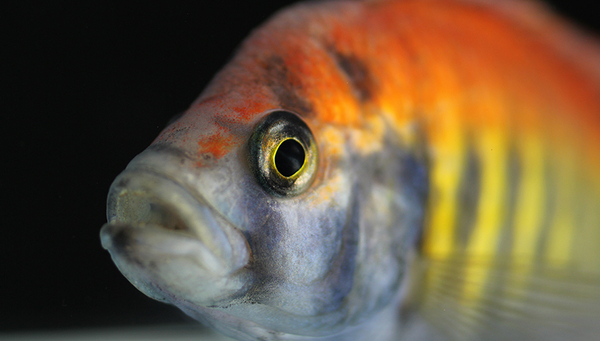Archive detail
Hybrids increase fish biodiversity in lakes of East Africa
December 5, 2019 |
When two individuals from different species mate, the offspring is known as a hybrid. As a result of the genomes being mixed, sometimes phenotypes are produced that deal with new environmental conditions better than the two parent species. Very often, hybrids are not able to reproduce, but there are quite a number of exceptions to this, including the cichlids. New species can emerge from such fertile hybrid populations. In other cases, however, hybrids are less well-suited to their environment and so contribute little to the gene pool of future generations. Which of these situations arises depends, among other things, on how many unoccupied ecological niches exist in the hybrids’ habitat.
In several earlier studies, Ole Seehausen and his team at Eawag and the University of Bern have highlighted the probable importance of hybridisation for the development of biodiversity in African lakes. Seehausen and his colleague Oliver Selz have now performed laboratory experiments with cichlids from Lake Victoria in Africa, in order to investigate the ecological mechanisms behind this phenomenon.
They discovered that hybrids are less efficient at using the food that the parent species are specialised to eat. But if the available food is expanded beyond the ecological niches of the parent species, hybrids are often then better able to exploit these new niches than their parents. Diverse ecosystems with as-yet unoccupied niches could therefore favour the emergence of new species.
Hybridisation promoted speciation in Lake Mweru
Another recent study that was reported in the journal Nature Communications also highlights the influence of hybridisation on speciation. Joana Meier and Ole Seehausen worked with an international research team to investigate the biodiversity and evolutionary history of fish in two large neighbouring African lakes – Lake Bangweulu and Lake Mweru. While eleven cichlid species colonised Lake Mweru from the Congo and Zambezi Rivers, only six species from the Zambezi ended up in Lake Bangweulu.
The researchers have now been able to show that around 40 new species have emerged in Lake Mweru from hybridisation between Congo and Zambezi species. However, the researchers did not find any new species in Lake Bangweulu, nor did they find any hybridisation between the colonising species. “The studies show that hybridisation between two species under certain ecological conditions can play a part in the emergence of numerous new species”, says Ole Seehausen.

